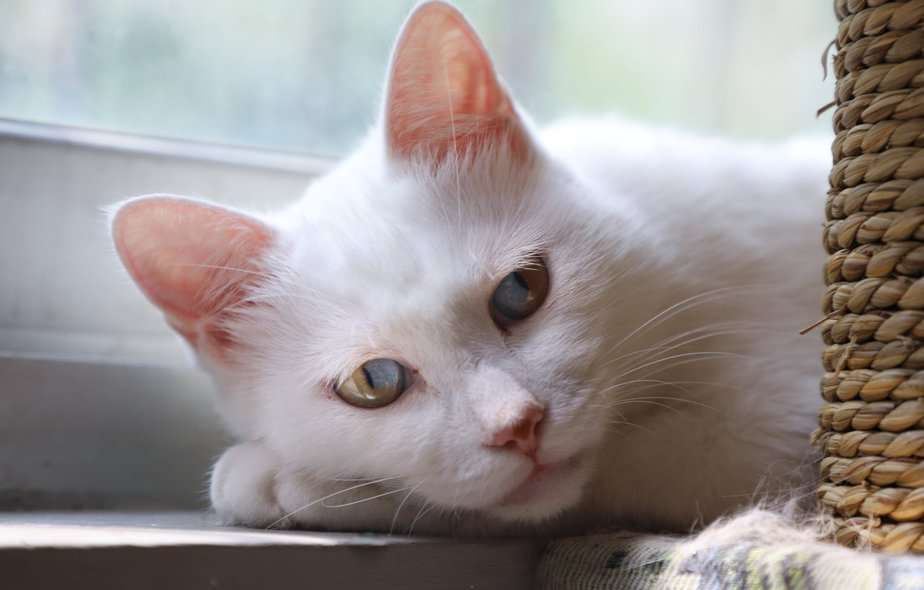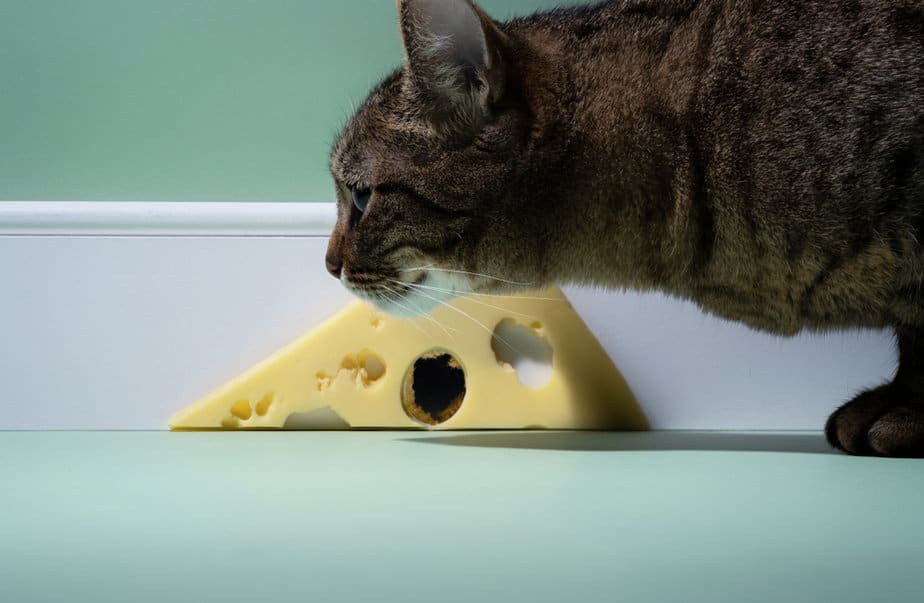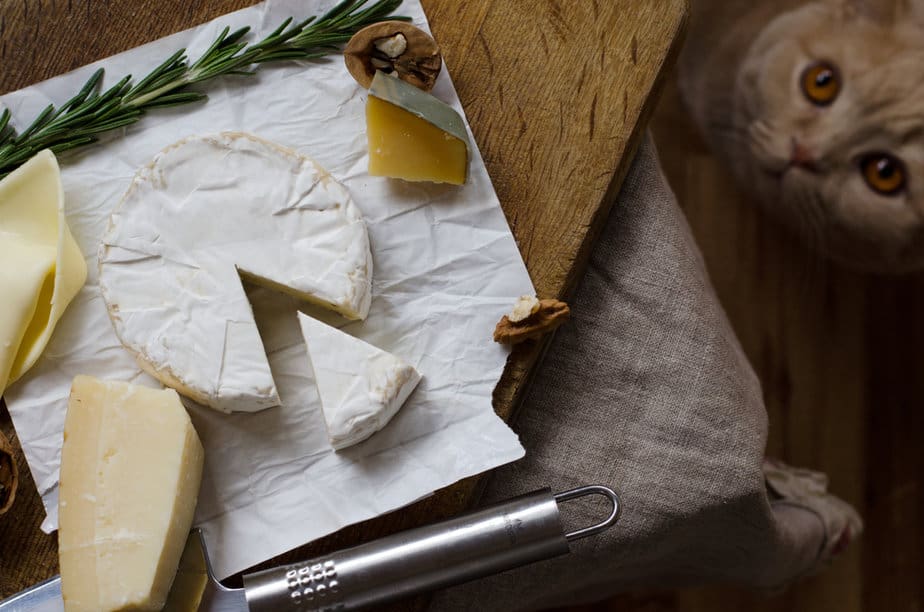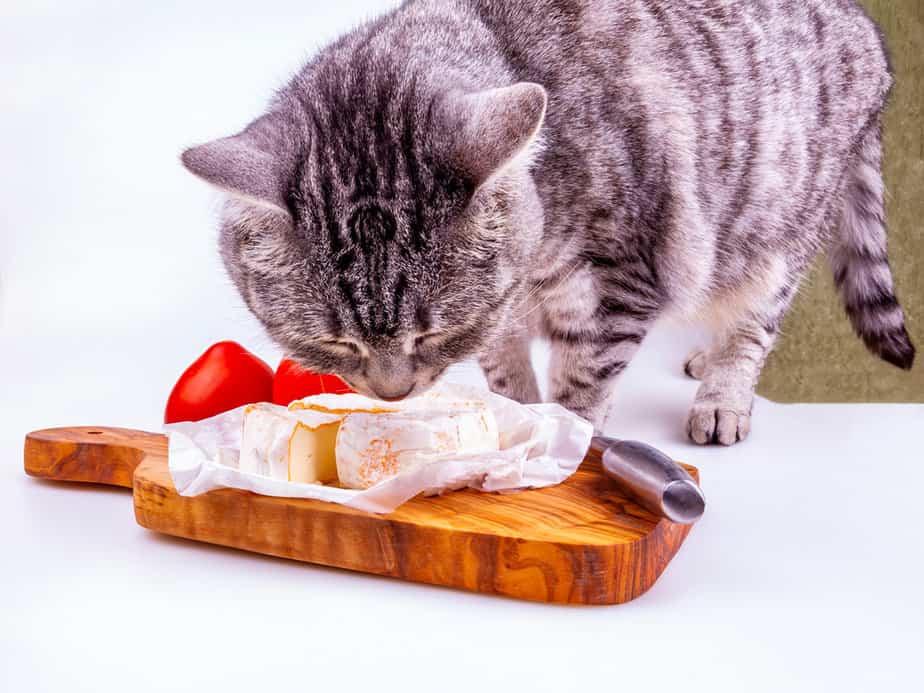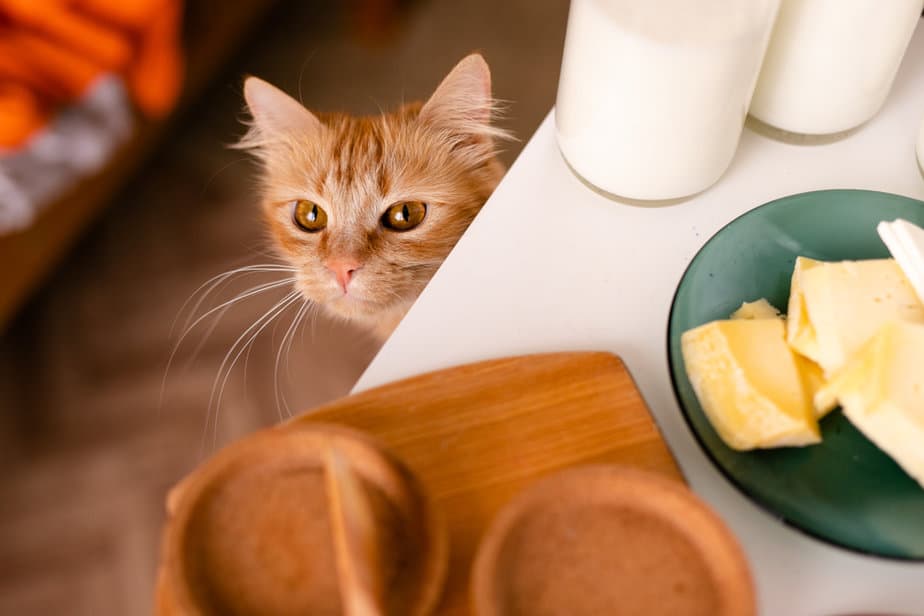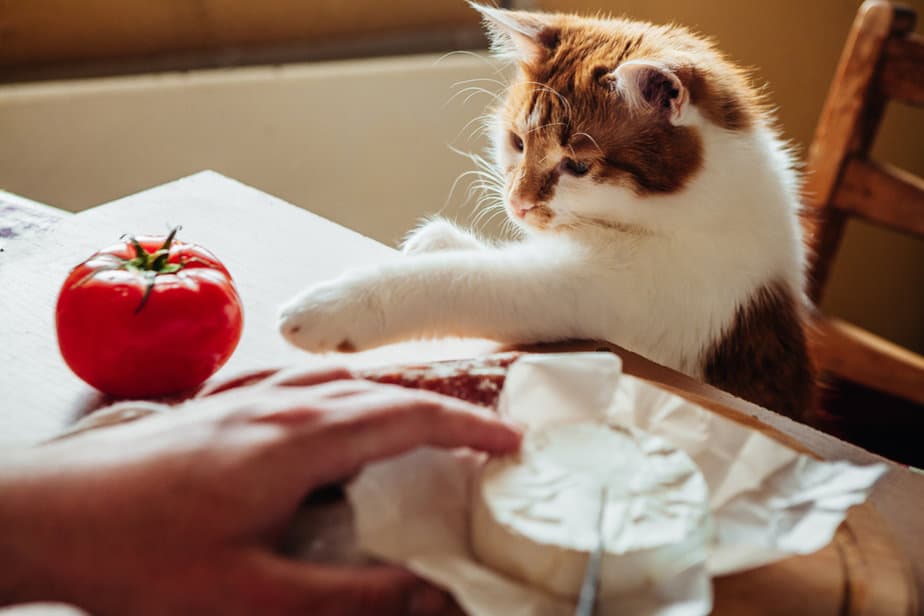📖 Table of Content:
We know that cheese is the most liked food among mice, but what about their sworn enemies? Can cats eat cheese or is it only an appropriate treat for their nemesis?
There are hundreds of types of cheese and it comes in all shapes, colors, and sizes. Not to mention the rich flavors they offer!
All of this just makes it harder for us to choose our favorite type. But when it comes to cats, I don’t think they can bother with that decision. They’d just rather have each kind, that’s how greedy our little furry pets are.
The thing is that it’s such a popular ingredient across the world and is found in most households. It has the power to be a staple of a dish, such as pizza. Because what is a Margherita without a slice of cheese, you know?
There were moments when I was enjoying some wine and cheese and that moment turned into me enjoying just one of those. It’s when my furry devil decided to help herself with my block of cheese! You’d think a carnivore would rather end up choosing meat over it any time.
Well, not to burst your bubble, but cats love cheese. I mean, who can blame them? It’s creamy, goes well with a lot of dishes, it’s simply delicious!
However, this doesn’t mean that you shouldn’t investigate if your pet decides to grab a hold of it. Just because something is delicious and your feline likes it, doesn’t mean it’s good for her.
Can cats eat cheese?
I know you’re dreading to know the answer to this one but hold your horses. Although cheese isn’t poisonous to felines, it isn’t highly recommendable.
A product made of milk can’t really meet a carnivore’s expectations and fulfill all of its requirements. I know that this doesn’t sound that alarming, but you should be cautious.
Some foods may not look dangerous, but they are still able to cause some damage. You know when you eat something delicious but your tummy just can’t hold it down?
Well, cats can experience the same thing. And before I tell you can cats eat cheese safely, keep that in mind. They’re sensitive creatures, even if they don’t look like it sometimes!
Now for the big reveal: yes, cats can eat cheese. BUT. There always has to be one of these. The thing is, your pet may be fine after having a bite or two of this treat.
However, if she manages to eat a whole block of it, she might become sick. It’s not advisable to feed your feline cheese regularly as it may lead to some stomach problems.
Where’s the problem?
You’d never think that a treat like this could cause any trouble. Unfortunately, I have to disappoint you. For all of you cheese lovers out there, I’m sorry for what I’m about to say.
It isn’t the most suitable ingredient to incorporate into your cat’s diet. Now, I know you’d love it if you could lounge with your pet and snack on this heavenly treat.
But things don’t always go in our favor. Your pet is a carnivore that needs to fulfill its dietary requirements. Her diet mainly consists of meat which provides her with a full package of protein and other essential nutrients.
Cheese, not so much. In fact, it can do her more damage than good. While you won’t feel any different after munching down on it, your pet is likely to feel some consequences.
Just like some humans, felines aren’t granted the luck and the joy of consuming dairy products. Cheese is a derivative of milk which calls for equal trouble.
1. Lactose intolerance and milk allergy
As a kitten, your pet had no trouble with drinking her mom’s milk. However, that changed over time. As she grew up, she lost the enzymes needed for breaking down the milk.
More precisely, she lost the enzymes that help digest the sugar found in milk, also known as lactose. Therefore, your pet is lactose intolerant which can give her a hard time with dairy products.
But not all cats will be affected in the same way. Perhaps your pet could easily get away with eating a full block of cheese or drinking a cup of milk.
On the other hand, she could have it worse and experience all the downsides that this treat brings along. Unfortunately, this includes stomach pain, diarrhea, as well as nausea, and vomiting.
Next to that, you could notice your pet bloats up quickly. Consequently, she will have to let out all those gases that have built up inside of her. And we both know that those aren’t the least bit enjoyable.
Next to being lactose intolerant, your cat could also be allergic to milk and its by-products. These two conditions may look the same but are rather very different.
While lactose intolerance implies the lack of enzymes in her body, an allergy is the body’s reaction to something that poses no danger to it, so it decides to fight back.
This can be a real pain in the neck but also a life-threatening situation. These two conditions have similar side effects, such as vomiting and diarrhea.
However, an allergic reaction is more of a cause for concern. Some of the signs that help you differentiate these two are skin rashes, breathing problems, and swelling of the throat.
If you notice any of these, your pet may be really struggling. It’s time to call your vet and bring your cat in for further assessment and treatment.
While an example of intolerance can go with just a bit of a tummy ache, an allergic reaction shouldn’t be left unattended.
2. All the calories!
Another thing that’s really not helping your pet’s case is the number of calories found in cheese. So, when you wonder can cats eat cheese, these should be the first thing to come to your mind.
Calories are a nutrient everybody needs, even felines. However, we all know what happens when we take in too much of them, right?
Your pet could build all of that unnecessary fat which could really weigh her down. Although this pun was intended, you shouldn’t take it as a joke.
Obesity is a serious problem many pets face nowadays. Their owners like to think that the best way to prove the love they have for their pets is to overfeed them.
Many people aren’t aware that you can’t always fulfill your cat’s wishes. We know how greedy they can be, so just imagine how long would they feast on those treats if we didn’t limit them.
The same goes for the cheese as well. If the situation gets out of hand, your furry friend may be in big trouble. It would be hard to deny her this tasty treat because she’s enjoying it that much.
On the other hand, it’s necessary to keep track of how much human food she has. Cheese, just like sour cream and other products, is packed with fat and calories.
3. Health risks
You don’t have a Jerry, you have a Tom, so you’re kind of baffled when you see your pet fighting for a slice of cheese.
Have you ever stopped to think about what’s so enticing in this small, yellow treat? There’s surely something that’s making your cat’s whiskers buzz.
As you could’ve guessed, it’s the high amount of fat cheese contains. Unfortunately for your feline, they’re mostly saturated and unhealthy.
Your pet won’t gain ten pounds if she grabs a bite or two of this snack, but if she continues to munch down on it regularly, she may become overweight. This is usually considered cute when you have a chubby pet because she seems so cuddly.
Ask any vet you like and they’ll all give you the same answer, something along the lines of; obesity can lead to a number of health issues related to raised cholesterol in the blood. Some of these include cardiovascular diseases followed by heart strokes.
Blood clotting is also a highly possible option. This is just too much of a risk and definitely not worth the five-minute pleasure she gets from a slice of cheese.
Besides, these illnesses can be also topped by diabetes and dental issues. The amount of carbs found in just one block of cheese is concerning for both Tom and Jerry.
4. Sodium content
When it comes to cheese, people tend to put salt content in the back of their minds. They’re oftentimes too preoccupied with the flavor to even think about what’s going on in that single block of goodness.
Well, sorry to burst your bubble, but there are certain ingredients that can ruin the fun for you. While the sodium content isn’t alarming for you, it might be an issue for your carnivore pet.
A few bites of cheese aren’t likely to hurt your cat, but feasting on it for an extended period might do just that. Cheese is also full of salt which isn’t healthy for your furry friend.
If she ever gulps down big quantities of it, she’s likely to be poisoned by it. Sodium toxicity may occur within hours and give your cat a real struggle.
Some of the symptoms of salt poisoning include vomiting, diarrhea, fatigue, and dehydration. In severe cases, felines may experience tremors, seizures, and even fall into a coma.
Once again, this isn’t likely to take place after a quick snack. However, you should be aware of the salt content present in this treat.
Bottom line
If your cat decides that she’s going to make herself dinner by stealing some of your cheese, don’t panic. Felines usually have a good intuition that leads them to the right choice.
They can also be wrong sometimes, but don’t worry. A few bites of this flavorful treat aren’t supposed to do her great harm.
However, as a carnivore, your pet can’t get enough of the nutrients she needs to thrive through cheese. Next to this lack of nutritional value, cheese is loaded with fat, calories, and salt.
These aren’t the best-case scenario for your fluffy friend. They can easily cause her trouble big time. What’s most alarming is that they can affect her in the long run.
